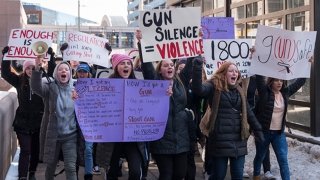With a new governor, state superintendent and legislators in Sacramento and a diminished federal role in education, there is an opportunity for California’s leaders to take stock of recent educational reforms and make necessary improvements. There are also a host of new and looming issues in K-12 and higher education. As California’s leaders confront these and other issues, where do California voters, including parents, stand on education and education policy?
In the newest edition of the USC Rossier/PACE Poll, voters cite reducing gun violence in schools as the top educational issue facing the state (8.59 on a 10-point scale)—a finding that held true across race, sex and many age groups. Reducing gun violence was the top issue for Democratic respondents, and second among Republicans after improving school discipline.
Among potential policy solutions: Voters showed the greatest support for expanding mental health (87 percent), followed by active shooter drills (77 percent). However, voters showed a schism based on party affiliation, with Democrats more likely to support banning and confiscating assault rifles or other high-capacity firearms (81 percent vs. 50 percent of Republicans) and Republicans showing more support for allowing local teachers to be armed (55 percent vs. 19 percent of Democrats).
“This poll sends an unmistakable message from voters to policymakers: Do something about gun violence,” said Karen Symms Gallagher, Emery Stoops and Joyce King Stoops Dean of USC Rossier. “We have the means and the expertise to prevent future tragedies, including through the improvement of social and emotional health. This is some of the most important work that policymakers can do, if they can put in the time and energy the public wants them to.”
The poll examined the attitudes of 2,000 California voters, in a survey conducted online from January 3–9, 2019. The poll was led by researchers at the University of Southern California Rossier School of Education (Julie A. Marsh and Morgan Polikoff) and Policy Analysis for California Education (PACE)(Heather J. Hough and David Plank), and was conducted by Tulchin Research. The PACE/USC Rossier poll has generally been conducted annually since 2012.
Other priorities
Voters cited college affordability as the second-most important education issue, though it was listed as the most important issue for voters age 18-49, voters with children and voters earning less than $35,000 per year.
In a somewhat surprising result, voters showed only moderate support for investing in early childhood education relative to other possible investments, such as college- or career-readiness programs, or improving the quality of K-12 education. Only 47 percent of respondents showed support for increasing spending on childcare and early education programs. Numerous studies have suggested positive and significant long-term benefits from investments in early childhood education.
As for how education initiatives would be paid for, the poll also asked voters to weigh in on a possible 2020 voting measure to alter Proposition 13, the state’s property tax law. During the Los Angeles Unified School District teachers’ strike in January 2019, many experts pointed to the tax law as a major hindrance to increasing California’s low per-pupil education spending rate, relative to other states. In what suggests a close fight to come, a narrow majority of voters (55 percent) voiced at least some support for changing the law.
More key findings:
- Voters are more confident that getting a college degree will lead to a middle-class life than those those with just a high school degree, but are far from certain.
- Voters continue to remain unaware of the state’s education funding law, the Local Control Funding Formula, though there were signs of slight improvement over 2018.
- There was almost no change in awareness of the California School Dashboard, nor any significant change in support of the Dashboard.
- Voters showed a strong support for teachers’ right to strike (64 percent), even when acknowledging the disruptive effects of a strike.




